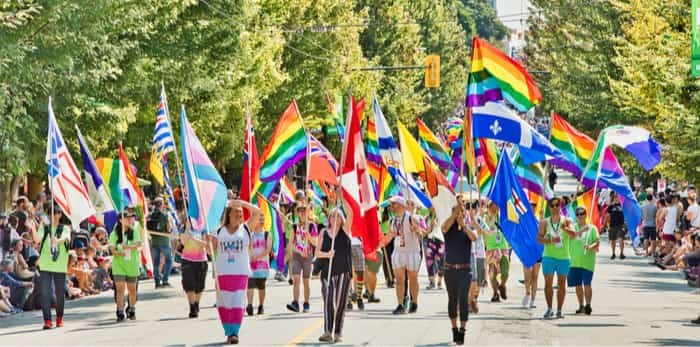 Vancouver, BC/Canada – August 5 2018 : Vancouver Pride Parade- People marching with rainbow flag / Shutterstock
Vancouver, BC/Canada – August 5 2018 : Vancouver Pride Parade- People marching with rainbow flag / Shutterstock
Sixteen years have passed since Ontario’s Court of Appeal issued a decision that effectively legalized same-sex marriage in Canada’s most populous province. In July 2005, the enactment of the Civil Marriage Act made Canada the fourth country to allow same-sex marriage, after the Netherlands, Belgium and Spain.
Over the past decade, the way in which Canadians have been exposed to same-sex relations has changed. Rainbow flags are now ubiquitous in campaigns – both political and commercial – and some companies are running television advertisements featuring same-sex couples.
In these same pages, we looked at how a majority of Canadians oppose the so-called “conversion therapy” and believe transgender Canadians should use the public bathroom of their choice. In spite of this, there are still pockets of intolerance, and long-standing perceptions might be to blame. When Research Co. asked Canadians last month, 45% of respondents thought people who identify themselves as lesbian, gay, bisexual, trans, gender diverse, queer, and Two-Spirit (LGBTQ2+) are “born this way,” while one in four (24%) believe they are “making a choice.” The “choice” reasoning is slightly more popular among men (27%), Canadians aged 35 to 54 (28%), Quebecers (27%), Conservative voters in the 2015 federal election (33%) and Canadians of East Asian descent (35%). Over time, the issue of legal recognition has no longer been problematic for most Canadians. Almost two thirds (64%) believe same-sex couples should continue to be allowed to legally marry – a proportion that includes 72% of women, 77% of those living in Manitoba and Saskatchewan and 75% of Liberal Party voters in the 2015 federal election. This leaves just over a third of Canadians who hold different feelings about same-sex marriage. While 15% of respondents would be content to go back to the concept of civil unions that are not recognized as marriage, 10% of Canadians believe there should not be any kind of legal recognition to these partnerships. Another 11% of Canadians are undecided. The way these issues evolve is not confined to marriage licenses. Some school districts in Canada have relied on “SOGI-inclusive education,” which raises awareness of and welcomes students of all sexual orientations, gender identities and family structures. Only one in five Canadians (20%) are opposed to SOGI-inclusive education being used in their province, while more than three in five (62%) are in favour of it. There are no enormous age differences on this issue, with support remaining fairly stable among millennials (64%), generation X (62%) and baby boomers (60%). As expected, Canadians who voted for the Liberals and the New Democratic Party (NDP) in the last federal election are more supportive of SOGI-inclusive education (70% and 63% respectively) than those who cast a ballot for Conservative candidates (53%). A matter that is decidedly more contentious is gay straight alliances (GSAs) and/or queer straight alliances (QSAs). These are peer support networks run by students and supported by school staff in order to promote a safe place for all students. When asked if school districts should be compelled to inform parents if their child participates in a GSA or QSA in school, there is a more uniform split. While 45% of Canadians think parents should “definitely” or “probably” be informed about their child’s participation in a GSA or QSA, 37% disagree and 18% are not sure. On a regional basis, the numbers are interesting. There are three areas where the number of residents who believe parents should be informed is higher than those who opt for a “don’t ask, don’t tell” attitude: Quebec (49% to 32%), British Columbia (46% to 35%) and Ontario (43% to 39%). Atlantic Canadians are evenly split (40% to 39%). On the Prairies, the numbers swing. There are more residents of Alberta (46%) and Manitoba and Saskatchewan (54%) who believe schools should not be compelled to advise parents of their child’s participation in GSAs or QSAs. In Alberta, discussions about this topic grew louder after the previous NDP government passed Bill 24, which made it illegal for teachers to tell parents if their child joined a GSA or QSA. The new United Conservative Party (UCP) government countered with Bill 8 in early July, which no longer provides legal protections for GSAs and QSAs in Alberta’s schools. There is no easy way to predict what will happen to LGBTQ2+ issues in Canada. When the venerable Gallup company asked Americans about “interracial marriage” in 1968, 72% of those surveyed disapproved of such unions. By 2013, 87% of Americans approved of them. Change usually takes time, awareness and education. Policy-makers should be smart enough to understand what most Canadians and many companies already know: the only “choice” at hand on LGBTQ2+ issues is one between prejudice and acceptance. Mario Canseco is president of Research Co. Results are based on an online study conducted from July 15 to July 17, 2019, among 1,000 adults in Canada. The data has been statistically weighted according to Canadian census figures for age, gender and region in Canada. The margin of error – which measures sample variability – is plus or minus 3.1 percentage points, 19 times out of 20.


